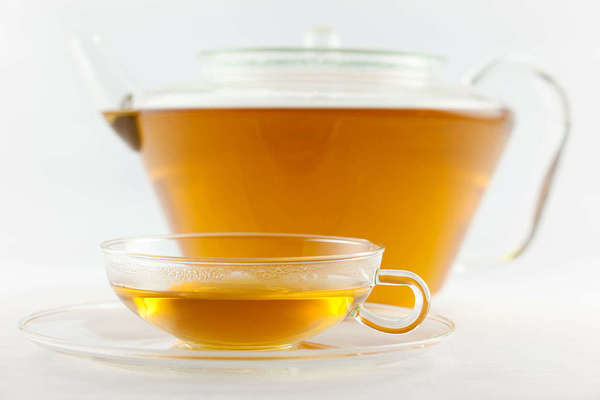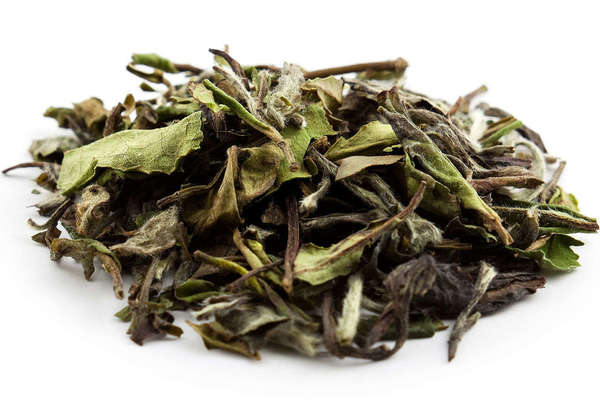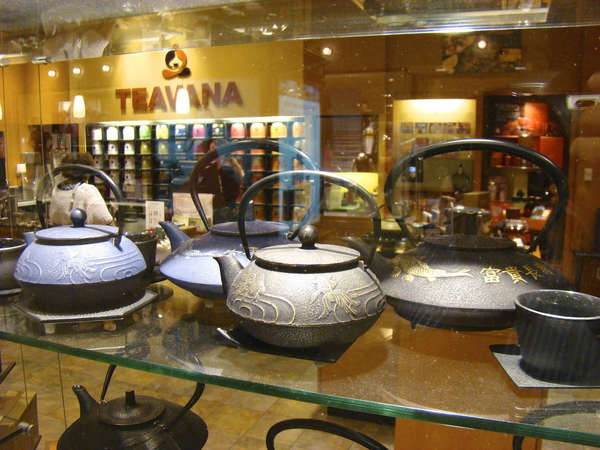White Tea and Caffeine - Myths and Reality
Last Updated: Mar. 5, 2018
 White tea, pictured here, is a type of tea that has been the subject of much misinformation when it comes to its caffeine content. Photo by André Helbig, licensed under CC BY-SA 3.0.
White tea, pictured here, is a type of tea that has been the subject of much misinformation when it comes to its caffeine content. Photo by André Helbig, licensed under CC BY-SA 3.0.Researchers studying the chemical composition of white teas relative to green and black teas concluded that the claims that white tea is lower in caffeine and higher in antioxidants than green tea are "complete nonsense".[4]
This article presents accurate information about the caffeine content of white teas, explores how these myths have been perpetuated, and highlights companies that have been working to promote accurate info in their marketing.
For more on these topics you can explore our articles on white tea and the antioxidants in tea.
White tea is not necessarily low in caffeine
White teas are diverse and have a wide range of caffeine contents, ranging from some of the milder, low-caffeine teas (around 15mg/cup), up through the teas with the highest caffeine content (around 75mg/cup). A 2009 study comparing one sample of white, green, black, oolong, and yellow tea found the white tea to be highest in caffeine; the study used white peony tea, a typical example of white tea.[5] Further sources for studies of caffeine content of specific teas can be found on our article on tea and caffeine.Higher grades of white tea, which taste milder and have a lighter color, are often higher in caffeine
 White peony tea, a white tea that is moderate in caffeine levels. Photo by André Helbig, licensed under CC BY-SA 3.0.
White peony tea, a white tea that is moderate in caffeine levels. Photo by André Helbig, licensed under CC BY-SA 3.0.Among the three most common types of Chinese white tea, silver needle (bai hao yinzhen) is the highest in caffeine, and has the lightest color and the mildest flavor. Shou mei (longevity eyebrows), the darkest of these three grades, has the boldest flavor but the lowest caffeine content, and white peony (bai mu dan) is somewhere in-between the two.
The highest grades of white tea with the lightest color, like silver needle, are tippy teas; the tips and leaf buds contain more caffeine because caffeine is produced by the plant as a defense against insects.
Blending with herbs reduces the caffeine content of any tea, including white teas
Most herbs are caffeine free, and when they are blended with tea, they lower the total caffeine content of the blend, assuming the resulting blend is brewed at a typical strength. In part because white tea tends to be expensive, it is common for white tea to be blended with other herbs. These blends can have a very low caffeine content, especially when white tea is only a small portion of the total weight of the blend.Teavana and other tea companies promoting myths
 Teavana has been one of the worst companies at perpetuating the myth that white tea is low in caffeine. Photo by Bob Hall, © Bob Hall, CC BY-SA 2.0.
Teavana has been one of the worst companies at perpetuating the myth that white tea is low in caffeine. Photo by Bob Hall, © Bob Hall, CC BY-SA 2.0.Our own research on tea and caffeine suggests that some white teas, including silver needle which is sold by Teavana, can contain over half the caffeine in a cup of coffee. Teavana removed this language from their website, but they kept a page White Tea - Loose White Teas and their Health Benefits through September of 2015, which claims "White tea has very little caffeine, 1-2% as much caffeine content as one cup of coffee". This page was taken down in October of 2015.
Although Teavana's claims were egregiously false for a typical pure silver needle tea, they may be true or at least closer to true for blends that contain smaller portions of tea leaf combined with many other herbs, and it is also possible that their particular teas are lower in caffeine.
Republic of Tea does not make explicit numerical claims about caffeine content, but they do have a section of their website titled low caffeine teas, which exclusively lists white teas, and claims that they are "Ever so slightly caffeinated" and have "just a hint of caffeine".[2]
| Lipton Tea | Caffeine/cup |
| White Tea with Island Mango & Peach | 15mg |
| White Tea with Blueberry & Pomegranate | 25mg |
Companies promoting accurate info
Lipton is a leader in honesty with respect to marketing when it comes to the caffeine content of their teas. On their website, they list the caffeine content of each tea. Lipton does not sell pure white teas, only flavored white teas that are actually blended with green tea, although the products are labelled only as "white tea".In the case of blends like these, the caffeine content is typically influenced more by the relative portion of tea used than anything else, since companies selling different flavored teas often use the same white tea as a base.
Usually it is only larger companies that have the resources to undertake and publish measurements of caffeine levels in specific teas. Camellia sinensis tea house is a notable exception; they published the results of a study of many of their teas; this study found that their bai mu dan (white peony) contained 39mg of caffeine per cup, but they did not measure the caffeine levels of any other white teas.[3]
Other companies working to dispel myths
Pearl Fine Teas has published a blog post about white tea and caffeine that presents similar information and cites more accurate sources. Canton Tea Co also tackled a number of myths about white tea and caffeine in their post Tea and Caffeine: Myth and Truth. Adagio Teas also puts forth accurate info in Caffeine in Tea, noting "Black, Oolong, Green and White tea leaves themselves have surprisingly similar caffeine content" and citing silver needle white tea as being among teas higher in caffeine.One of the earliest studies published by a company that sells tea was done by Elmwood Inn Fine Teas, a wholesaler, and is shown in Bruce Richardson's article Too Easy to be True: De-bunking the At-Home Decaffeination Myth, originally published in Fresh Cup magazine. This page cites early work by Nigel Melican of Teacraft, who was active debunking myths back before many others had tackled this issue. Nigel Melican's work provided much of the inspiration behind RateTea's main article on tea and caffeine with the original work Caffeine and Tea: Myth and Reality, published on the CHA DAO blog.
What you can do to curb myths
Each of us, including people shopping for tea, and anyone who uses the internet, can play a role in helping to dispel myths surrounding white tea. Some of the ways you can help:- Avoid buying from companies that make false claims - Avoiding companies promoting myths, false health claims, and exaggerations as a marketing technique can put financial pressure on companies and discourage them from doing these things.
- Buy from companies that provide accurate info or do not make any claims about caffeine content - Making no claims is better than making false ones; most companies don't have the resources to measure the caffeine content of each tea, so they make no such claims. This is a more honest approach, and rewarding these companies by buying from them can encourage more companies to do the same.
- Check for sources and don't believe everything you read online - Many websites make a lot of unsourced claims about the health properties or caffeine content of white tea. If you don't see sources backing up the supposed facts, don't believe them, because they could be made up or repeated from another source that made them up.
- Share well-researched material - If you share, link to, and pass on accurate, well-researched material to others, you will help accurate information to reach a broader audience, and help to dispel myths.
References
1. Teavana.com: White Teas, Internet Archive Wayback Machine, Oct. 14, 2012.
2. Republicoftea.com: Low Caffeine Teas, Internet Archive Wayback Machine, May 31, 2013.
3. Tea and Health - Analysis of Caffeine, Determination of caffeine by liquid chromatography – UV, in collaboration with College Centre for the Transfer of Technologies TransBIOTech, Retrieved Jul. 16, 2013.
4. Y. Hilal, U. Engelhardt, Characterisation of white tea – Comparison to green and black tea, Journal für Verbraucherschutz und Lebensmittelsicherheit, November 2007, Volume 2, Issue 4, pp 414-421.
5. D. Komes et. al., Determination of Caffeine Content in Tea and Maté Tea by using Different Methods (PDF), Czech J. Food Sci., Vol. 27, 2009, Special Issue.

